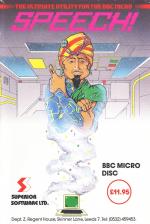Previous speech synthesisers for the Beeb have been expensive because the software has been marketed on Eprom and purchase of a speech chip has been required to produce the necessary sound effects. Superior Software have produced a price breakthrough by achieving an apparent technical impossibility. David Hoskins, the programmer, has cleverly programmed the sound chip to do things which its designers never intended it to do. The result is a speech synthesiser using standard hardware and marketed
get the idea that the speech quality is *good* - it isn't. The point is that it is little if any worse than that produced by its much costlier rivals.
As if that was not enough, the accompanying software has 'intelligent' routines which allow remarkable ease of programming as I shall explain below.
Chris Payne, Superior's marketing director, tells me that they decided to avoid Eprom software and sell Speech! for the price of a game because they would like as many people as possible to have the program. The disadvantage of this is that the standard machine code patch takes up nearly 8k of memory space and restricts users' programs to Mode 7. However, the company have thoughtfully provided a version in ROM format on the tape/disc which may either be Epromed or run in Sideways RAM. In this case, Speech! commands may be included in a user's Basic program of any length in any Mode. My discussions with the company indicate that they may also be willing to supply Eprom versions at reasonable cost on demand.
The voice synthesiser is activated by * commands which may be typed in directly at the keyboard or incorporated into the user's Basic or machine code programs. There are two main commands: *SAY and *SPEAK. *SPEAK allows words to be programmed by laborious construction from phoneme tables. It is the *SAY command which makes the software special, however. In this case, words are entered in normal English spellings and the program will pronounce them correctly in 90% plus of cases. Of the remainder, some quick experimentation with unorthodox spellings will normally bring them into line. This remarkable ease of programming has been achieved by incorporating only a small vocabulary of known words and a much larger set of spelling-sound conversion rules. Whilst accuracy of pronunciation is compromised somewhat compared with vocabulary systems, the enormous advantage of this approach is the virtually unlimited number of English words which Speech! can attempt to pronounce.
Superior Software have included several demo and utility programs on the tape/disc. One of these will read and pronounce an Ascii file - e.g. text saved from a wordprocessor. The routines are programmed to take account of punctuation, pausing at commas and inflecting for question marks etc. The text speaking routine could be used to help you proof a printout. Since the program gives very clear pronunciation of numerals, this could be particularly useful for checking tables of numbers - e.g. by SPOOLing the output of a spreadsheet.
A most practical application example also provided is a spelling checker. This has always been a problem case for educational software - how to test spellings without printing the word and revealing all. The supplied program uses a combination of speech synthesis and context - i.e. sentences with the word in question blanked out. This program is well-designed and effective and users are encouraged to customise it with their own examples. None of the software is protected, incidentally - a calculated risk to go with the low pricing policy. With utility software, unlike games, program protection frequently underlines the value of a program to the user. In this case, for example, it is convenient to be able to transport the software patch between various tapes and discs containing the programs you write to make use of it.
The program has gone into immediate use in my household. My older children - aged 8 to 12 - immediately started to write their own speech programs due to the remarkable simplicity of the *SAY command. My four year old, Hugh, was intrigued by the talking computer, though understandably puzzled that it insisted on calling him 'Huff' (you can't win them all!). I also had a chance to give the program a more public test. It was time to write another program for the local primary school's fund raising and I had already written a Santa Claus program. The children give their name, address etc too Santa and get a personalised letter printed out. The program was hastily re-written to make use of the *SAY command, not only to vocalise the program's prompts but also to give personal messages. For example, after entering the child's name, the string "Hello" + name$ was passed to *SAY via OSCLI so that Santa greeted each child personally via a string variable. The reaction of the children, especially the little ones, was quite delightful to observe.
In short, Speech! is a very clever and useful program being offered at a silly price. If you were planning to buy yet another arcade game, take my advice and spend the money on Speech! instead.


 1st March 1986
1st March 1986








